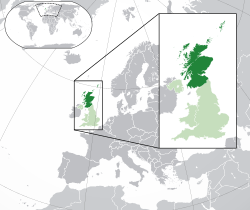
Back Skotland Afrikaans Schottland ALS ስኮትላንድ Amharic Escocia AN Scotland ANG إسكتلندا Arabic سكوطلاندا ARY سكوتلاند ARZ Escocia AST Iskusiya Aymara
Scotland | |
|---|---|
| Motto: "In My Defens God Me Defend" (Scots)[a] "In my defence God me defend" | |
| Anthem: Various[b] | |
 Location of Scotland (dark green) – on the European continent (green & dark grey) | |
| Status | Country |
| Capital | Edinburgh 55°57′11″N 3°11′20″W / 55.95306°N 3.18889°W |
| Largest city | Glasgow |
| Official languages[c] | |
| Ethnic groups (2011) | |
| Religion (2011) | List of religions
|
| Demonym(s) | |
| Government | Devolved parliamentary legislature within a constitutional monarchy[e] |
• Monarch | Charles III |
| John Swinney | |
| Shona Robison | |
| Parliament of the United Kingdom | |
| • Secretary of State | Alister Jack |
| • House of Commons | 59 MPs (of 650) |
| Legislature | Scottish Parliament |
| Formation | |
| 9th century (traditionally 843) | |
| 17 March 1328 | |
| 3 October 1357[10] | |
| 1 May 1707 | |
| 19 November 1998 | |
| Area | |
• Land | 77,933 km2 (30,090 sq mi)[11] |
• Water (%) | 3.00% |
| Population | |
• 2019 estimate | |
• 2011 census | 5,313,600[12] |
• Density | 67.5/km2 (174.8/sq mi) |
| GVA | 2017 estimate |
| • Total | £138 billion[13] |
| • Per capita | £25,500[13] |
| GDP (nominal) | 2020 estimate |
• Total | £166.8 billion[14] |
• Per capita | £30,530 ($44,000)[15] |
| HDI (2018) | 0.913[16] very high · 4th |
| Currency | Pound sterling (GBP; £) |
| Time zone | UTC (Greenwich Mean Time) |
• Summer (DST) | UTC+1 (British Summer Time) |
| Date format | dd/mm/yyyy (AD) |
| Driving side | left |
| Calling code | +44 |
| ISO 3166 code | GB-SCT |
| Internet TLD | .scot [f] |
| |

Scotland (Scots: Scotland, Scottish Gaelic: Alba [ˈal̪ˠapə] (![]() listen)) is one of the four constituent countries of the United Kingdom. The main part of it is the northern third of the island of Great Britain. Many other islands in the British Isles are also part of Scotland. To the south of Scotland is England. The North Sea is to the east. The Atlantic Ocean is to the west. The Irish Sea is to the south-west.
listen)) is one of the four constituent countries of the United Kingdom. The main part of it is the northern third of the island of Great Britain. Many other islands in the British Isles are also part of Scotland. To the south of Scotland is England. The North Sea is to the east. The Atlantic Ocean is to the west. The Irish Sea is to the south-west.
The capital city of Scotland is Edinburgh on the east coast. The biggest city is Glasgow on the west coast. The other cities in Scotland are Aberdeen, Dundee, Inverness, Perth, Stirling and Dunfermline. About five million people live in Scotland. Most of the population lives in the Central Belt, an area between the Scottish Highlands and the Scottish Lowlands.
Unlike most of Great Britain, most of Scotland was not part of the Roman Empire (only the southern half of Scotland – then named Caledonia – was under Roman control for a century) and did not become part of Anglo-Saxon England. The Kingdom of Scotland started in the 9th century AD. In 1603, James VI of Scotland inherited the Kingdom of England and Kingdom of Ireland. In 1707, the parliament of Scotland joined with the parliament of England to become the Parliament of Great Britain. This formed the United Kingdom of Great Britain. This kingdom joined with the Kingdom of Ireland in 1801 to make the modern United Kingdom.
- ↑ "St Andrew—Quick Facts". Scotland. org—The Official Online Gateway. Archived from the original on 11 November 2007. Retrieved 2 December 2007.
- ↑ "St Andrew". Catholic Online. Retrieved 15 November 2011.
- ↑ "St Margaret of Scotland". Catholic Online. Retrieved 15 November 2011.
- ↑ "Patron saints". Catholic Online. Retrieved 15 November 2011.
- ↑ "St Columba". Catholic Online. Retrieved 15 November 2011.
- ↑ "FACT: SCOTLAND'S OFFICIAL LANGUAGES ARE ENGLISH, SCOTS, GAELIC & BRITISH SIGN LANGUAGE". Scotland.org. Retrieved April 29, 2022.
- ↑ Other religion"Analysis of Religion in the 2001 Census - gov.scot". www.gov.scot. Retrieved 8 October 2019.
- ↑ Scotland's Census (27 March 2011). "Scotland's Census 2011 – National Records of Scotland" (PDF). Scotland's Census. Retrieved 8 October 2019.
- ↑ "2011 Census: Key Results from Releases 2A to 2D" (PDF).
- ↑ "The Treaty of Berwick was signed - On this day in Scottish history". History Scotland. 3 October 2020.
- ↑ Region and Country Profiles, Key Statistics and Profiles, October 2013, ONS. Retrieved 9 August 2015.
- ↑ "Population estimates by sex, age and administrative area, Scotland, 2011 and 2012". National Records of Scotland. 8 August 2013. Retrieved 8 August 2013.
- ↑ 13.0 13.1 Office for National Statistics. "Regional gross value added (income approach), UK: 1997 to 2017, December 2015". Retrieved 24 April 2017.
- ↑ "Scottish Economic Statistics January 2021". www.scottish-enterprise.com. Archived from the original on 2019-11-14. Retrieved 2021-01-24.
- ↑ McGeoch, Adam. "A Guide to Scottish GDP". Fraser of Allander Institute.
- ↑ "Sub-national HDI – Area Database – Global Data Lab". hdi.globaldatalab.org. Retrieved 13 September 2018.
- ↑ "Languages - gov.scot". www.gov.scot.
- ↑ "European Charter for Regional or Minority Languages". Scottish Government. Retrieved 23 October 2011.[dead link]
- ↑ Macleod, Angus "Gaelic given official status" (22 April 2005) The Times. London. Retrieved 2 August 2007.
- ↑ "Scotland becomes first part of UK to recognise signing for deaf as official language". Herald Scotland. 2015. Retrieved 17 January 2016.

